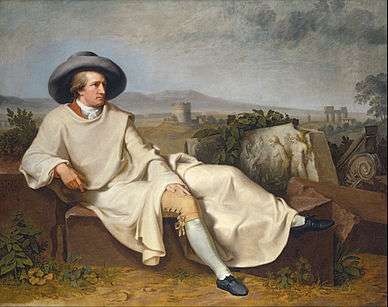German new humanism
The German new humanism (German Neuhumanismus) was a movement that emerged in Germany around 1750. The term was coined by the historian Friedrich Paulsen in 1885. It was a continuation of the original humanism of the renaissance. Central to the movement was a rediscovery of Antiquity, and the movement was linked to a humanistic idea of knowledge, referred to as Bildung, and to the idea of humanity, the intellectual, physical, and moral formation of "a better human being." Some its major participants include Johann Matthias Gesner, Johann August Ernesti, Christian Gottlob Heyne, Friedrich August Wolf, Gotthold Ephraim Lessing, Johann Gottfried Herder, Johann Wolfgang von Goethe, Friedrich Schiller, Friedrich Hölderlin and Wilhelm von Humboldt.
Its program was described by Friedrich August Wolf as Studia humanitatis which "include anything that contribute to make human education (Bildung) and mental and emotional forces into a beautiful harmony of the inner and outer man."[1]
References
- Friedrich August Wolf, Darstellung der Alterthumswissenschaften, 1832, p. 45
Literature
- Friedrich Paulsen: Geschichte des gelehrten Unterrichts, Band 2, Der gelehrte Unterricht im Zeichen des Neuhumanismus, Leipzig 1885
- Clemens Menze: Die Bildungsreform Wilhelm von Humboldts, Hannover 1975 ISBN 3-507-38149-4
- Herwig Blankertz: Die Geschichte der Pädagogik. Von der Aufklärung bis zur Gegenwart, Wetzlar 1982 ISBN 3881780556
- Bruno Hamann: Geschichte des Schulwesens, 2. Aufl., Bad Heilbrunn 1993 ISBN 3781507483
- Herwig Blankertz/Kjeld Matthiessen: Neuhumanismus, in: Dieter Lenzen (Hg.): Pädagogische Grundbegriffe, rowohlts enzyklopädie, 6. Aufl. Reinbek 2001, Bd. 2, S. 1092-1103 ISBN 3-499-55488-7
- Manfred Fuhrmann: Latein und Europa. Die fremdgewordenen Fundamente unserer Bildung. Die Geschichte des gelehrten Unterrichts in Deutschland von Karl dem Großen bis Wilhelm II., Köln 2001 ISBN 3-7701-5605-6
- Hubert Cancik: Europa - Antike - Humanismus. Humanistische Versuche und Vorarbeiten, Transcript Verlag, Bielefeld 2012 ISBN 3837613895
